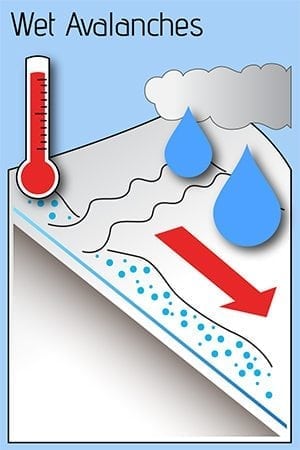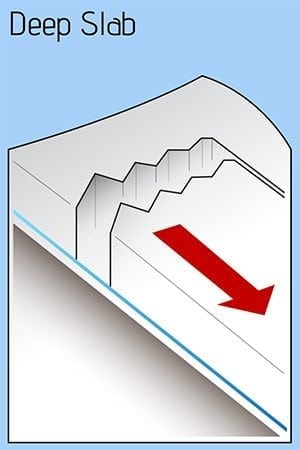Valdez
Above 3,000ftModerate
1,500 to 3,000ftModerate
Below 1,500ftModerate
Degrees of Avalanche Danger
Avalanche Problems
Problem 1
Temperatures climbed to 40° F at seal level yesterday. This prompted some large wet loose activity releasing from steep planar slopes on 1/20. As temperatures remain elevated above the freezing mark, human triggered wet loose avalanches will be possible in steep terrain today. Depending upon the size of the slope these can be dangerous, as they have the potential to entrain (gather) large amounts of snow that have the ability to knock a person off their feet or machine. Terrain choice is very important with this avalanche problem. When choosing an area to recreate imagine how much mass of wet loose snow is above you (size of slope) and what would happen if you were to be carried down hill (are there terrain traps?). At upper elevations where the temperature is below freezing, top heavy storm slabs will exist 1-2 feet in depth. These will be possible to trigger in steep terrain.
The hazard from this avalanche problem will slowly decrease as temperatures are forecasted to drop through the day. Some large wet loose avalanches occurred on 1/20 with no step downs noted. This points to strength in our mid snowpack.
Likelihood:
- Almost Certain
- Very Likely
- Likely
- Possible
- Unlikely
Size:
- Historic
- Very Large
- Large
- Small
Trend
- Increasing
- Steady
- Decreasing
Problem 2
Faceted snow at the base of our snowpack has not been reactive for 15 days, on 1/6 one outlier avalanche occurred at mid elevation near Thompson Pass (see avalanche activity section). Prior to this, avalanches haven’t occurred since 12/16 at these deep layers.
Rounding (strengthening) has been observed at these facets in all three forecast zones, but this process takes a lot of time. At this point triggering an avalanche at this layer is unlikely. Once significant snowfall returns to our area, expect for the potential to affect these deep layers to increase. The most recent storm is not expected to be big enough to affect deep persistent layers.
Unlikely does not mean impossible, and triggering an avalanche deep in the snowpack would carry significant consequences. The most likely place to affect these layers would be in thin, rocky areas in the Continental zone.

Rounding facets near the base of our snowpack from Cracked Ice at 4000′ on 1/11.
Likelihood:
- Almost Certain
- Very Likely
- Likely
- Possible
- Unlikely
Size:
- Historic
- Very Large
- Large
- Small
Trend
- Increasing
- Steady
- Decreasing
Avalanche Activity
Below is a summary of observed Avalanche activity from the last 7 days. Avalanches that were noted earlier in the season can be viewed by clicking the link below.
If you trigger or observe a natural avalanche consider leaving a public observation.
1/20- Numerous large (D2) wet loose avalanches released from steep planar slopes in the Port of Valdez. These were caused by a foot or more of snow falling with temperatures rising to 40° F at sea level directly following. No step downs noted.
1/17- Numerous wet loose point release were observed on solar aspects in the Port of Valdez. Most of these originated from rocks were the suns energy permeated into dry snow and caused surface snow to become upside down. No step down slab avalanches were observed.
-Small (D1) spin drift avalanches on the lee side of Tones Temple ridge triggered a small slab at the 1/14 BSH layer.

Weather
Check out our updated weather tab! A collection of local weather stations are available for viewing with graphs and tabular data included.
NWS Watches and warnings
NONE NWS Point forecast for Thompson Pass
Date Saturday 01/21/23 Sunday 01/22/23 Time (LT) 06 12 18 00 06 12 18 00 06 Cloud Cover OV BK OV OV OV OV OV OV OV Cloud Cover (%) 75 65 70 70 90 95 95 95 100 Temperature 23 19 15 9 17 23 25 22 25 Max/Min Temp 24 9 25 22 Wind Dir N NE NE E E SE E E SE Wind (mph) 16 19 16 6 6 8 12 12 10 Wind Gust (mph) 27 Precip Prob (%) 20 10 30 20 50 70 70 70 80 Precip Type S S S S S S S 12 Hour QPF 0.03 0.04 0.11 0.20 12 Hour Snow 0.0 0.0 0.7 3.3 Snow Level (kft) 0.0 0.0 0.0 0.0 0.1 0.2 0.3 0.8 1.0
Click on link below for Thompson Pass weather history graph:

| Date:
01/21 |
24 hr snow | HN24W* | High temp | Low temp | 72 hour SWE* | January snowfall | Seasonal snowfall | Snowpack Depth |
| Valdez | 0 | 0 | 41 | 32 | .69 | 39 | 136 | 54 |
| Thompson pass | N/O | N/O | N/O | N/O | N/O | 63 | 250 | 44 |
| 46 mile | 8 | .52 | 25 | 13 | N/O | 32 | ~66** | 42 |
*HN24W- 24 hour Snow water equivalent in inches
*SWE– Snow water equivalent
**46 mile seasonal snowfall total begins December 1st.
Additional Information
Click on the link below for a running summary of the seasons weather history.
Announcements
The avalanche hazard is moderate at all elevations in the Port of Valdez. Temperatures have climbed well above freezing at sea level, making it possible to trigger wet loose avalanches in steep terrain. Avoid traveling in or above terrain traps. The hazard will be decreasing as temperatures are forecasted to slowly decrease over the next 24 hours.
Posted by Gareth Brown 01/21 7:45 am.
For a description of current avalanche problems, weather information, season history and more click the (+ full forecast) button. Avalanche forecasts will be issued Wednesday-Sunday.
If you have pictures of recent natural or human triggered avalanches or notice signs of instability such as shooting cracks or collapsing, leave an observation to help improve forecast accuracy.

